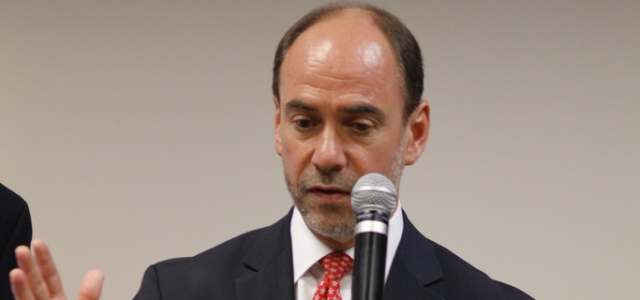 Following the introduction of the Senate immigration reform bill earlier this week, the Senate Judiciary Committee held its first hearing about the measure today. It gave the senators a chance to air their various complaints about the bill – that it does not protect LGBT couples or that the bill micro-manages the hiring process for foreign workers – but largely, committee members asked about the ways immigration reform will impact the U.S. economy, from the agriculture industry to high-skilled industries.
Following the introduction of the Senate immigration reform bill earlier this week, the Senate Judiciary Committee held its first hearing about the measure today. It gave the senators a chance to air their various complaints about the bill – that it does not protect LGBT couples or that the bill micro-manages the hiring process for foreign workers – but largely, committee members asked about the ways immigration reform will impact the U.S. economy, from the agriculture industry to high-skilled industries.
Originally, Homeland Security Secretary Janet Napolitano had planned to testify, but her appearance was cancelled as law enforcement officials continued to hunt for one of the suspects in the Boston Marathon bombing. Committee Chairman Sen. Patrick Leahy (D-VT) said her testimony would be rescheduled. Instead, the senators heard from attorney Peter Kirsanow and Douglas Holtz-Eakin, former Director of the Congressional Budget Office under President George W. Bush. Despite Kirsanow’s insistence that immigration reform would hurt wages for American workers, Holtz-Eakin explained to the committee that, based on his research, “There is good reason to believe that immigration raises the wages of American workers.”
As Sen. Chuck Schumer (D-NY) pointed out during the hearing, a large number of undocumented immigrants are already in the U.S. working in low-skilled positions, leaving them vulnerable to exploitation. Holtz-Eakin said it would help if these workers were legalized because employers need access to workers who are skilled at that type of work, especially in the agriculture industry.
More broadly, Holtz-Eakin laid out in his testimony that fixing the nation’s broken immigration system could help the U.S. economy:
Immigration reform is a potentially powerful tool of economic policy that can positively affect economic growth and help shrink the federal deficit. My recent analysis of a benchmark reform puts the budgetary impact in the range of $2.5 trillion over 10 years.
The 2007 immigration reform legislation offers a starting point for determining the “budgetary costs of the current immigration reform proposal,” he said. But many of the enforcement measures included in the bill are expansions of current programs, “likely reducing the discretionary spending required to implement the expanded programs.” And according to Holtz-Eakin’s testimony, the net effect of higher wages for legalized immigrants along with higher tax revenue would be a net positive: “Deficit reduction from higher growth–combined [with] higher tax revenues from higher incomes, lower mandatory spending from diminished participation in income and employment-related spending programs, and interest savings–would exceed $2.5 trillion.”
In all, Friday’s hearing helped to bolster the case for why the Senate immigration reform bill will only help the U.S. economy. There is still a lot to do on the legislation, but without it, as Sen. Lindsey Graham (R-SC) said during the hearing, “we can’t get to where we want to go as a nation.”
Photo by Michael Jolley
FILED UNDER: Douglas Holtz Eakin, Douglas Holtz Eakin immigration, Economics, Hearings, immigration reform, Republicans


